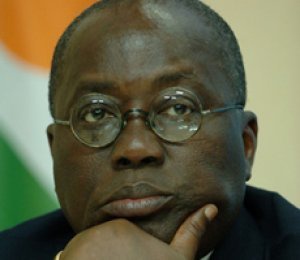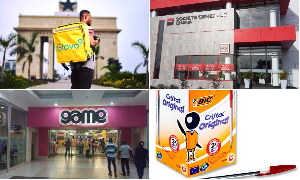- Home - News
- TWI News | TV
- Polls
- Year In Review
- News Archive
- Crime & Punishment
- Politics
- Regional
- Editorial
- Health
- Ghanaians Abroad
- Tabloid
- Africa
- Religion
- Election 2020
- Coronavirus
- News Videos | TV
- Photo Archives
- News Headlines
- Press Release
General News of Thursday, 10 January 2013
Source: The Herald
UK Crush Akufo-Addo’s Court Case
A highly respected London-based think tank connected with Her Majesty, the Queen of England, has evaluated the 2012 General Elections in Ghana and issues emerging in its aftermath, declaring the polls as the best election held in Ghana since the country returned to multi-party democracy in 1992.
Chatham House, the group, which in October 2008, awarded then President John Agyekum Kufuor with its prestigious Chatham House Prize –Crystal and a scroll signed by Queen Elizabeth II – made some very interesting observation about the two dominant political parties at last polls, Nana Akufo-Addo’s failures, John Mahama’s prospects as president and his relationship with ex-President JJ Rawlings.
At a forum held at its offices, Chatham House, on December 19, 2012 in London, Prof Paul Nuggent, Director of the Centre of African Studies at the University of Edinburgh in Scotland, intimated that despite the problems encountered by the Electoral Commission (EC) with the biometric identification, last month’s elections were, in his view, the best ever election held in Ghana.
Comparing the 2008 and 2012 elections, Prof. Nuggent who was the main speaker at the forum, pointed out that although there were more technical problems in the 2012 elections, there had been less manipulation of the process, thus making the results of the 2012 elections more credible.
The forum was chaired by Mr. Alex Vines, Research Director at Chatham House.
To illustrate his point, Prof. Nuggent indicated that in 2008 there were some unusually high voter turnouts in some constituencies in the Ashanti Region, as much as 98.3 per cent in one instance, as well as credible incidents of violence and voter intimidation.
Analyzing the defeat of the NPP in the 2012 elections, Prof. Nuggent proffered that the NDC was always more successful whenever it highlighted its credentials as the party of the ordinary Ghanaian as opposed to the NPP which is portrayed principally as an Akan-dominated party.
Prof. Nuggent went further to question whether the NPP would have selected a candidate from Northern Ghana as flagbearer, as the NDC had done with the choice of President John Mahama after the death of President John Atta Mills.
Drawing a comparison between President Mahama and Nana Akufo-Addo, Prof. Nuggent contended that many Ghanaians regarded the President as an active, dynamic and healthy person, compared to the late President Mills who was viewed by some Ghanaians as unwell, and as a result lethargic in his disposition and style of governance.
In the case of the NPP flagbearer, Prof. Nuggent contended that although Nana Akufo-Addo had delivered some brilliant speeches during the election campaign, he [Nuggent] was of the view that the NPP flagbearer came across as a “Winston Churchill type” politician, and as such failed to connect with the electorate, thus leading to his defeat in the polls.
Prof. Nuggent was full of praise for the electoral process and the institutions of State, such as the EC, which had demonstrated their competence to the international community.
On his prognosis for Ghana’s future, Prof. Nuggent argued that President Mahama appeared to be in a more solid position than the late President Mills in dealing with the challenges of the country, particularly”- because he [Mahama] had no political baggage or pressure from former
President Rawlings. He [Nuggent] pointed out that President Mills had struggled to deal with interference from the ex-President, adding that President Mahama could proceed to contain ex-President Rawlings by ignoring the latter.
In his view, President Mahama would be better served by pushing him to the political fringes simply by bestowing upon the former President the privileges and recognition as an elder Ghanaian statesman.
With respect to forming a government, Prof. Nuggent described it as a possible challenge given the perceived lobbying by various groups within the NDC and elsewhere, particularly the so-called “Fante Confederacy”.
According to Prof. Nuggent, another challenge for the Mahama Administration would be the management of the country’s oil resources, although he expressed optimism that the Petroleum Management Law and the mechanisms being put in place under the law to oversee the oil and gas sector could be put to use to ensure effective utilization of revenue accruing from the oil sector.
Prof. Nuggent went on to cite corruption as another challenging issue for the Mahama Administration, pointing out that perceptions of corruption within the NDC contributed significantly to the NDC losing the 2000 elections.
He, therefore, urged President Mahama to pay close attention to issues of corruption in the country.
Prof. Nuggent further intimated that votes from urban communities in Ghana had always been instrumental in determining the winner of elections in Ghana, which tended to swing between the NDC and the NPP.
In this connection, it was critical for President Mahama to pay attention to the needs of urban communities in the country, particularly the provision of roads, electricity and water, as well as ensuring that sustained economic growth trickles down to all sections of the country.
In Prof. Nuggent’s view, the NDC had the opportunity to consolidate its political gains in the coming years, but should avoid complacency in view of the “skirt and blouse” voting phenomenon in the country.
Prof. Nuggent concluded his presentation by describing President Mahama’s support for Mr. Alan Kyerematen’s bid for the WTO position as a strategic move intended to eliminate the latter as a ‘possible challenger in the 2016 presidential election.
In a subsequent question and answer session, Prof. Nuggent referred Ghana’s electorate as a sophisticated group for whom substantive socio-¬political and economic issues were a major determinant in the selection of political leaders. Present at ex-President Kufuor’s 2008 impressive award ceremony were His Royal Highness, the Duke of Edinburgh, Prince Philips, Dr. Robin Niblett, Director, Chatham House; Lord Ashdown; Dr DeAnne Julius, Chairman, Chatham House; Lord Hurd; Dr Ngozi Okonjo-Iweala, Managing Director, World Bank; Mr. Malcolm Brinded CBE. Mrs. Theresa Kufuor; President Kufuor, Otumfuo Osei Tutu II, King of the Ashanti Kingdom and Mrs. Gina Blay of the “Daily Guide” among others. Those who sponsored the 2008 event included Royal Dutch Shell plc (lead sponsor), Bloomberg, British American Tobacco, Chevron, Ghana Cocoa Marketing Company (UK) Limited, Ghana International Bank, Oranto Petroleum, Pan-African Capital Group LLC and Databank Group and Tullow Oil.
The ceremony was held at the Drappers’ Hall at London.











